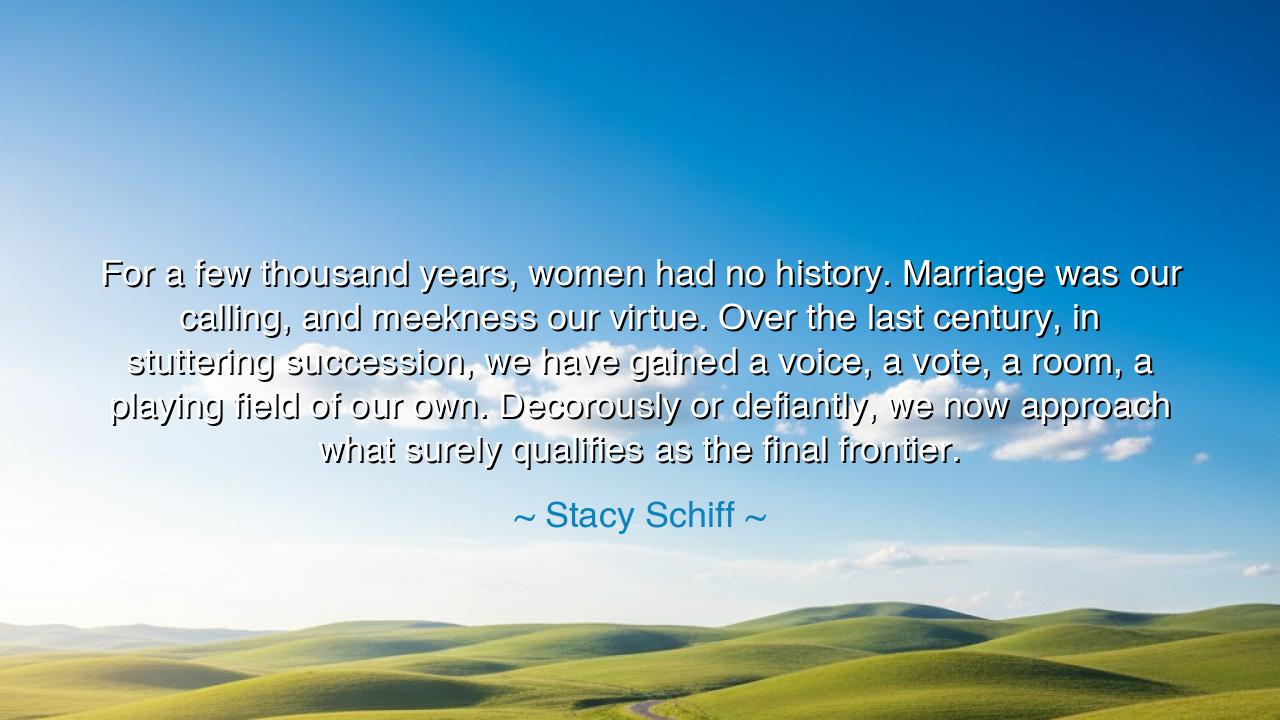
For a few thousand years, women had no history. Marriage was our
For a few thousand years, women had no history. Marriage was our calling, and meekness our virtue. Over the last century, in stuttering succession, we have gained a voice, a vote, a room, a playing field of our own. Decorously or defiantly, we now approach what surely qualifies as the final frontier.






In the words of Stacy Schiff, “For a few thousand years, women had no history. Marriage was our calling, and meekness our virtue. Over the last century, in stuttering succession, we have gained a voice, a vote, a room, a playing field of our own. Decorously or defiantly, we now approach what surely qualifies as the final frontier.” These words sweep across the ages like a river of memory, carrying with them both sorrow and triumph. Schiff speaks of silence transformed into sound, of shadows transformed into light, of a people long hidden now emerging to claim their rightful place in the chronicles of humankind.
The ancients, if they looked upon history’s scrolls, would see how little ink was given to women’s names. Kings and warriors filled the records, but wives and mothers were consigned to obscurity. For centuries, marriage was not merely a bond but a cage, binding women’s destinies to household and hearth, their worth measured by their meekness, their silence praised as virtue. Schiff names this long exile from history with piercing truth: women’s stories were not told, their power not acknowledged, their wisdom not recorded.
Yet as she proclaims, the last century brought upheaval. The cry for a voice rose first, through the pens of women who dared to write, even in secret. Then came the demand for the vote, won by courage, protest, and even imprisonment. The “room of one’s own,” spoken of by Virginia Woolf, symbolized intellectual independence, the right to thought and creation. And the playing field, both literal and symbolic, marked the struggle for equality in work, in sport, and in all pursuits where women sought to prove that strength and skill are not the province of men alone. Step by halting step, through decorum or defiance, women advanced, carving out a history where none had been granted before.
History itself offers radiant examples. Consider Emmeline Pankhurst, who led the suffragettes in England, defying jeers, imprisonment, and violence to secure the vote for women. Or Marie Curie, who claimed her room in the laboratory and became the first woman to win a Nobel Prize, twice crowned for her discoveries. Or Billie Jean King, who stepped onto the playing field of tennis and, with every match, proclaimed that women deserved both recognition and respect. Each of these women, and countless others unnamed, turned Schiff’s words into living truth: history, once silent, now had a chorus of female voices.
Yet Schiff also names the final frontier, a phrase that stirs both hope and challenge. For though women have won rights once denied, the battle is not complete. Inequalities endure—in wages, in representation, in safety, in recognition. The frontier that remains is not a single victory, but the dismantling of every invisible wall that still confines women, in every nation and every sphere. It is the call to move beyond token inclusion toward true equality, not in isolated victories but in the fabric of daily life.
The lesson for us is clear: history is not finished, and progress is not guaranteed. The gains of voice, vote, room, and field must be guarded, expanded, and carried into the future. Each generation must take up the work anew, for silence always waits at the edges, eager to return. To honor the past, we must live courageously in the present, and to protect the present, we must prepare the way for those yet unborn.
Practical actions flow from this wisdom. Listen to women’s voices, for they carry truths too long ignored. Defend the rights hard-won, ensuring they are not eroded by indifference or backlash. Encourage equality in every field, whether in schools, workplaces, or nations. And above all, write women into history—record their achievements, celebrate their triumphs, and tell their stories, so that no daughter of the future will be told she has no past.
Thus, Stacy Schiff’s words ring as both remembrance and prophecy. They honor the long centuries of silence, the hard-fought gains of the past century, and the vast horizon that still lies ahead. Let us carry them forward like a banner in the wind: that the final frontier is not unreachable, but waiting, calling, urging us onward until history speaks not of men alone, but of all humanity—equal, whole, and free.






AAdministratorAdministrator
Welcome, honored guests. Please leave a comment, we will respond soon